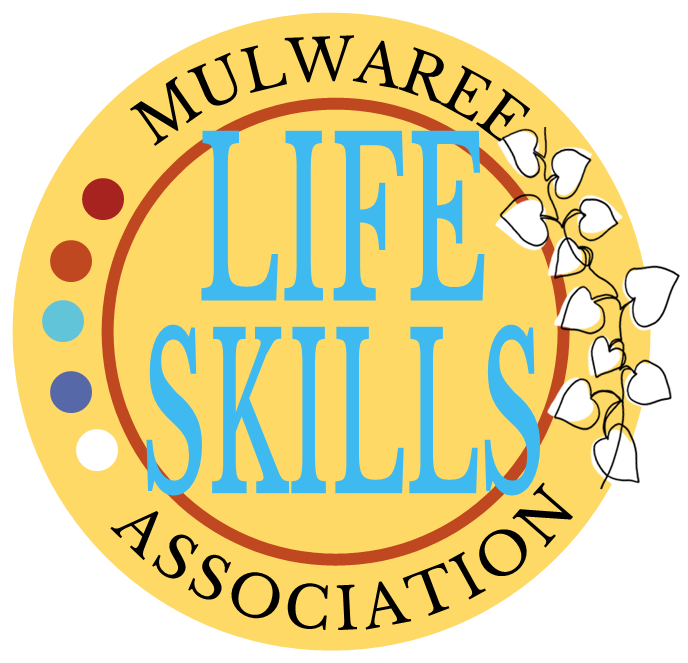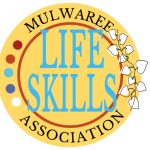At Mulwaree Life Skills, our mission is to ensure that people with disabilities have access to education and training that not only empowers them but also equips them with skills to thrive in the workforce. One of our most innovative approaches is the development of classrooms that specifically cater to both the individual with a disability and their carer. These classrooms are designed to ensure that the person with a disability and their carer work together, learning side-by-side, and are able to enter the workforce as a team. This unique dynamic enables both individuals to complement one another’s strengths, enhancing the working environment and breaking down barriers to employment.
The Classroom Setup
Our pop-up style classrooms are portable, allowing us to take education on the road and set up anywhere, from regional centres to urban hubs. The flexibility of these classrooms ensures that we can meet the needs of individuals regardless of their location. Each classroom is equipped with state-of-the-art technology, designed to accommodate a wide range of disabilities. Whether the student needs assistive communication tools or adaptive learning technologies, we ensure every student can fully participate.
Within these classrooms, carers receive specific training tailored to their role in the workplace, while individuals with disabilities focus on acquiring technical skills. The joint learning environment creates a collaborative bond, ensuring both the individual and the carer feel confident in their roles and responsibilities in the workforce.

Courses Available at Mulwaree Life Skills
Our courses span various industries, with a focus on developing computer literacy and preparing individuals for the technology-driven job market. Below is a list of computer courses offered:
1. Basic Computer Literacy
- Objective: To provide foundational computer skills for individuals with limited or no prior experience.
- Topics Covered:
- Introduction to computers and operating systems.
- Understanding basic software (Word, Excel, and PowerPoint).
- Internet navigation and online safety.
- Email communication and etiquette.
- Outcome: Students will gain confidence in using computers for everyday tasks, communication, and basic data entry.
2. Microsoft Office Suite Mastery
- Objective: Master the Microsoft Office suite, which is essential for many clerical and administrative positions.
- Topics Covered:
- Word: Document creation, formatting, and advanced editing.
- Excel: Spreadsheets, formulas, charts, and pivot tables.
- PowerPoint: Creating impactful presentations.
- Outlook: Managing emails, calendars, and contacts.
- Outcome: Proficiency in the Microsoft Office suite, which can be applied in various office settings.
3. Digital Marketing Basics
- Objective: To introduce students to the basics of digital marketing, allowing them to pursue roles in advertising, social media management, or content creation.
- Topics Covered:
- Website design basics using platforms like WordPress.
- Search Engine Optimisation (SEO) and keywords.
- Social media management across platforms like Facebook, Instagram, and LinkedIn.
- Email marketing campaigns.
- Outcome: Understanding the fundamentals of digital marketing, enabling students to assist small businesses or run their own online campaigns.
4. Introduction to Web Development
- Objective: To teach the basics of website development, equipping students with skills to build simple websites.
- Topics Covered:
- HTML, CSS, and JavaScript basics.
- Web hosting and domain management.
- Building responsive websites.
- Outcome: Ability to create and maintain a personal or small business website.
5. Introduction to Networking and IT Support
- Objective: To provide a foundation in networking and basic IT support, preparing students for entry-level positions in IT.
- Topics Covered:
- Understanding computer networks and their components.
- Setting up home and small office networks.
- Basic troubleshooting for common IT issues.
- Outcome: Skills needed for entry-level IT support roles, such as helpdesk positions.
6. Data Entry and Office Administration
- Objective: To provide essential skills for clerical roles, focusing on accuracy and efficiency.
- Topics Covered:
- Data entry software (such as Excel and Access).
- Filing systems, both physical and digital.
- Time management and organisational skills.
- Outcome: Preparation for roles in office administration, where attention to detail and organisation are key.
7. Coding for Beginners
- Objective: To introduce the fundamentals of coding, helping students explore future opportunities in technology and programming.
- Topics Covered:
- Basic programming languages: Python, JavaScript.
- Logic and problem-solving in coding.
- Developing simple applications.
- Outcome: A solid understanding of coding principles, which can be further developed into a specialised skill set.
8. Graphic Design with Canva
- Objective: To introduce graphic design principles and tools using Canva, an accessible platform for creating digital designs.
- Topics Covered:
- Basic design theory (colour, layout, and typography).
- Using Canva for social media, print media, and branding.
- Creating professional-looking designs without advanced technical skills.
- Outcome: Confidence in creating visually appealing designs for both personal and business use.
Specialised Course: Actuarial Pathway for Autistic Individuals
In addition to our general computer courses, we offer a specialised course aimed at helping autistic individuals enter the finance industry as actuaries. Autistic individuals often have strong analytical and mathematical skills, making them well-suited to roles that require precision, logic, and attention to detail, such as actuarial work. Actuaries use mathematics, statistics, and financial theory to assess risk, a role that is critical in insurance, pensions, and investments.
9. Actuarial Pathway for Autistic Individuals
- Objective: To provide a structured pathway into the finance industry, specifically targeting roles as actuaries.
- Topics Covered:
- Introduction to statistics, probability, and financial mathematics.
- Understanding risk assessment and management.
- Real-world applications of actuarial science in insurance and finance.
- Industry-standard software used by actuaries.
- Outcome: Preparation for entry-level actuarial positions, with a focus on developing the mathematical and analytical skills needed to succeed.
This course not only focuses on the technical aspects but also incorporates training on the communication and teamwork skills necessary for the finance industry. We work closely with organisations to ensure that placements and internships are available upon course completion, allowing our students to transition smoothly into the workforce.
Creating Inclusive Opportunities
The combination of technical training and the supportive relationship between the individual and their carer enables greater success in transitioning to the workforce. At Mulwaree Life Skills, we are committed to providing opportunities that cater to the strengths of each person, focusing on both their abilities and their potential. Our classrooms are not just spaces for learning—they are environments where confidence is built, and futures are shaped.
By ensuring that both the individual with a disability and their carer are trained together, we empower them to enter the workforce with a shared understanding of their roles. This dynamic creates a collaborative working relationship that maximises productivity and ensures that both individuals feel supported in their journey.
With our comprehensive course offerings, ranging from basic computer literacy to specialised actuarial training, Mulwaree Life Skills is paving the way for more inclusive, adaptive, and collaborative work environments across industries.

